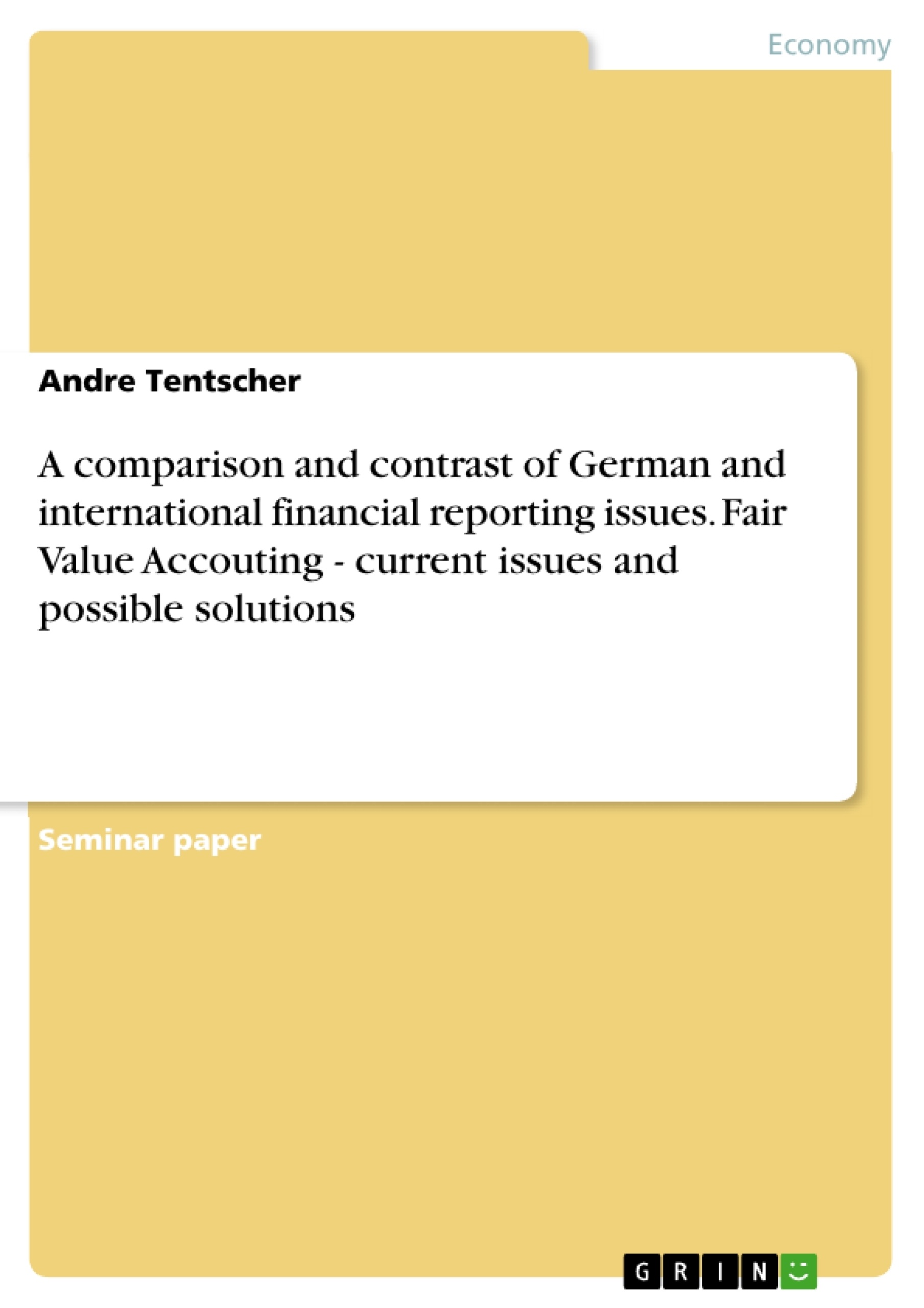Huge changes arose in the world of economy during the last decade. Due to globalisation and competition for scarce capital1 a heightened discussion regarding different national accounting policies emerged. There has been an intensive controversy between continental-European and Anglo-American based accountancy. All companies listed on a stock exchange in the EU are obliged to present their group accounts in accordance with IAS/IFRS2 from 2005 on. One crucial aspect of IRFS focuses on the increasing tendency to recognise a fair value which implies a departure from historical cost-based financial statement to a rather market value-based one. Subsequently, this paper introduces and compares the current valuation bases of the German commercial/tax law and IRFS. Because of the increasing importance of IFRS the major point reflects this consideration. Finally, contrasts will be emphasised and opportunities for a complete takeover of an advanced fair value accounting to German accountancy will be examined. For this reason a reference to the general objectives and principles both of the accountancies is inevitable and will be introduced in either case.
Table of Contents
- I. Introduction
- II. Fair value accounting according to German law
- A. Objectives and basic principles
- B. Concepts of valuation
- 1. Valuation bases as to commercial code
- 2. Valuation bases as to tax law
- III. Fair value accounting according to IFRS
- A. Objectives and basic principles
- B. Concepts of valuation
- 1. General survey of valuation bases
- 2. Definition and determination of fair value
- 3. Fundamental ideas for a fair value measurement
- 4. Impetus for a fair value measurement
- a) IAS 16
- b) IAS 39
- c) IAS 40
- IV. Comparison and contrasts of fair value accounting concepts
- V. Conclusions and perspectives
Objectives and Key Themes
This paper examines the current valuation bases of German commercial and tax law, comparing them to International Financial Reporting Standards (IFRS). It explores the increasing importance of IFRS and its implications for German accounting practices. The main focus is on the concept of fair value accounting, its objectives, and potential for integration into German accounting systems.
- Comparison of valuation bases in German law and IFRS
- Objectives and principles of fair value accounting
- Analysis of the impact of IFRS on German accounting
- Opportunities for a complete adoption of fair value accounting in Germany
- Potential challenges and solutions in implementing fair value accounting
Chapter Summaries
The introduction highlights the growing significance of globalisation and competition for capital in the modern economy. It contextualizes the need for harmonized accounting standards, particularly the transition from historical cost-based accounting to a market value-based system represented by IFRS.
Chapter II delves into fair value accounting according to German law, examining its objectives and principles. The chapter also analyzes valuation bases under German commercial and tax law, demonstrating the emphasis on creditor protection and conservative profit recognition.
Chapter III explores fair value accounting under IFRS, outlining its objectives, principles, and valuation concepts. It discusses the importance of defining and determining fair value, examining the motivations for implementing fair value measurement within specific International Accounting Standards (IAS) such as IAS 16, IAS 39, and IAS 40.
Chapter IV delves into a comparative analysis of fair value accounting concepts as they exist under German law and IFRS. This chapter examines the similarities and differences between the two accounting frameworks, highlighting potential challenges and opportunities for harmonization.
Keywords
The primary keywords and focus topics of this paper are: fair value accounting, IFRS, German commercial law, German tax law, valuation bases, historical cost accounting, market value accounting, creditor protection, conservative profit recognition, globalization, competition for capital, harmonization of accounting standards.
- Quote paper
- Andre Tentscher (Author), 2004, A comparison and contrast of German and international financial reporting issues. Fair Value Accouting - current issues and possible solutions, Munich, GRIN Verlag, https://www.grin.com/document/60135



